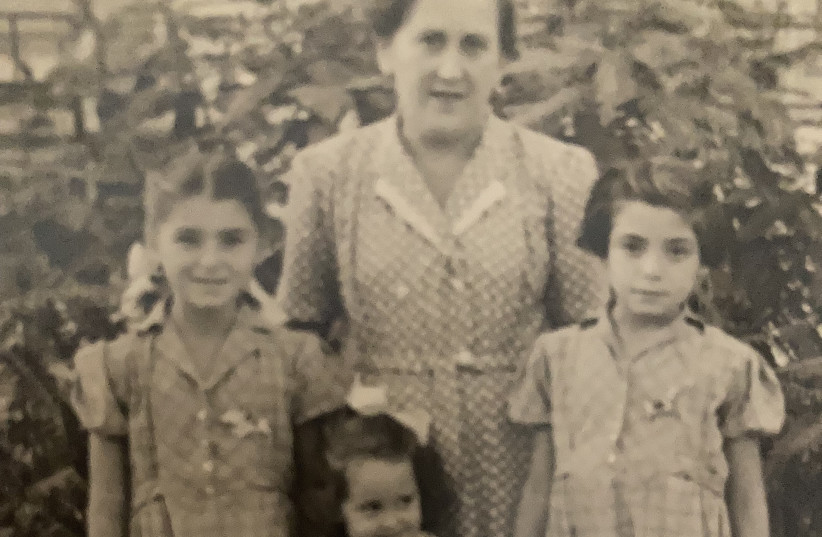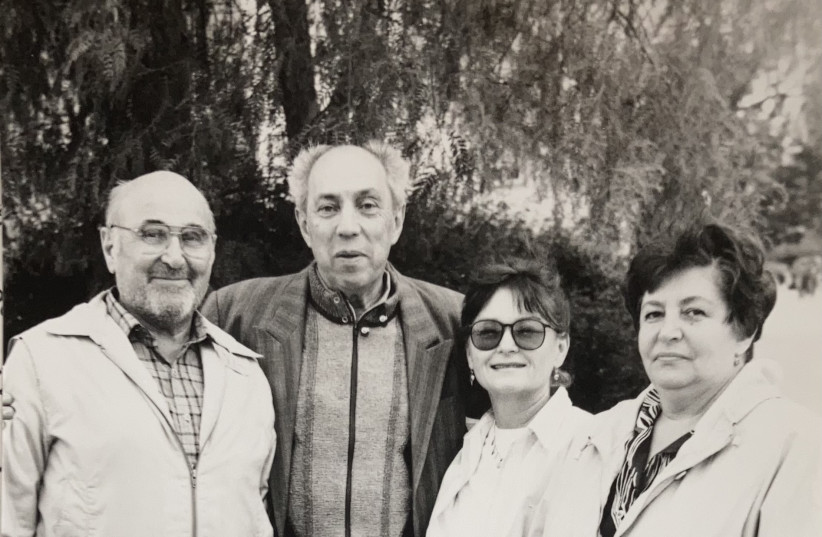“Dora isn’t really my mother,” said Yocheved, as we were mounting the stairs to the third floor of 45 Maccabi St. to reach her parent’s apartment, “but, please don’t mention it at dinner.”
I had just taken a bus to 144 Hayarkon St., where the offices of the Israel Motion Picture Studios are located and where I met with Yocheved ‘Yochi’ Gisburg. We proceeded together north to what was the northern edge of Tel Aviv in 1954, in order to formally introduce me to Yochi’s (as she was and still is called in Israel) parents and sisters. Yochi’s last sudden remark caught me by surprise. What did this mean and why can’t it be mentioned were questions that immediately arose in my mind, but there was no time to ask them because the apartment door opened and I was welcomed into Yochi and her family’s home.
Five years later, we were married in Chicago, but that’s another story.
Needless to say, the next time Yochi and I met again over tea and cake, I posed the questions that were on my mind since the dinner. Yochi began to explain rather hesitantly: “I really don’t know the whole story,” she began, “All I know is that Dora is not our mother, our real mother is dead. She committed suicide when we were about four years old, but we never mention or discuss it at home. I think my father believes that we were too young to remember the suicide and that we are willing to accept the fiction that Dora is our mother, but he is wrong. We certainly remember the event.”
“Why are you saying we?” was my next question. “Well, Ruthi, who you met at the dinner, is my twin sister.”

Yochi continued, “When Dora became part of the family, our father told us that Dora is our mother and we should call her mother, which we did.” Then Dora became pregnant and a third daughter, Nurit, was added to the family. “We don’t have any photographs of our real mother, birth certificates or any other papers. The whole thing is just a big fat secret in the family.”
It took the next 40 years for the story to slowly unfold and, once again, demonstrated what bitter pain and chaos the Holocaust inflicted on Jews for decades, even long after the war had ended and the Nazis had been defeated. It wasn’t until a chance meeting in Israel in 1993 that the many blank spaces in the story were filled.
Of course, as the twins became older, the desire to learn more became more urgent. Ruthi did some searching at home and discovered some interesting but unidentified negatives of photographs. She decided on a multi-purpose trip to Paris in order to visit the twins’ only living first cousin, to heal her broken heart, to assist caring for the cousin’s little daughter, and to talk to her cousin and learn what she could about the family secrets.
When she returned from Paris a year later, she related to Yochi the few facts that she learned: Their father, Solomon Ginsburg, born in Grodno, Poland, is a graduate in electrical engineering from the Berlin University, who came to Tel Aviv in 1935. There he met an Israeli young women and, apparently, fell in love. However, shortly thereafter, Solomon’s mother (Hasha) arrived from Poland and notified her son Solomon that she had arranged his marriage to a lovely and well-educated young woman from a very prominent Jewish family in the town of Slonim, Poland. Such arranged marriages were, apparently, not so unusual because they enabled the marriage partner to escape from the Nazi threat in Poland and gain permission to enter the Palestine Mandate, despite of the very restrictive British rules.
A few months later, Hannah Epstein, the “lucky bride from Poland,” arrived in Tel Aviv and met her husband. Solomon apparently accepted his mother’s decision and obediently acknowledged Hannah as his wife. In 1937, twin sisters, Yochi and Ruthi, were born, but they were not born in Tel Aviv. As I mentioned earlier, Hannah Epstein came from an important Jewish family in Slonim. Her father was the head of the local Jewish hospital and convinced his daughter to come home to Poland and deliver the baby at a modern hospital instead of a who-knows-how-good hospital in the Middle East. Consequently, Hannah traveled to Poland where – surprise! – twins were born.
Hannah returned to Tel Aviv, but only with Yochi. She left Ruthi in Slonim in the care of her sister. Ruthi was left behind because she was deemed to be not strong enough to travel. In 1942, Hannah, the mother of Yochi and Ruthi, fell off a balcony and died. There were two possible causes for her despair that were rumored in the Jewish circles of Tel Aviv. My uncle Alfred, who was privy to most of the gossip around town, claimed that Hannah learned that her husband may have been unfaithful. The other report that may have caused the despondency was the tragic news that all the Jews of Slonim, including Hannah’s complete family, were murdered by the invading German army. Whatever the reason, Hannah was dead and the twins were motherless; however, shortly thereafter, Dora entered the family as the wife of Solomon and became the mother of the twins.
All this new information was never brought up in the family, as the secrets continued. When the twins’ half-sister, Nurith, was slated to be married, her two older sisters finally sat down with Nurith and, for the first time, revealed the fact that Dora is, in fact, Nurith’s mother but not the twin’s mother, that Nurith was not a sister but a half-sister.
ALL THESE secrets continued to be secrets until 1993.

By then, both Dora and Solomon had passed away. My wife and I happened to be visiting Israel when Yochi received a phone call from her sister Ruthi, with the news that there may be someone in Israel searching for them. In 1993, there was a special department in the Israeli government known as searches for relatives. They advised Ruthi that there is a family, recent arrivals from Russia, who may be related to her and her twin sister. Yochi broke into tears when she got the news. Ruthi, on the other hand, was much cooler to the situation – she, apparently, never forgave her biological mother for abandoning her in Poland and then, two years later, tearing her away from the only mother she knew.
After a few more phone calls, a meeting was arranged for the two of us to drive to Ma’ale Adumim to meet Lev Epstein and his family for what became a five-hour-long heart wrenching exploration, revelation and disclosure of the events that took place in the family during the past 45 years. Slowly, the missing pieces in the Yochi and Ruthi secret story began to fall into place. As well for the very first time, Lev learned the secrets of his side of the family: That his aunt Hannah, his father’s sister, had committed suicide, that he was meeting Yochi, his first cousin, that he did not know existed and the fact that she had a twin sister. This was all news to him.
We, on the other hand, learned that Lev’s father, Aaron, followed the Russian army after World War I, left Poland and moved to Moscow. Aaron’s son, Lev, became a doctor of mathematics and Aaron’s daughter, Mira, became a doctor of philosophy. When the Stalin government started to pursue and execute Jewish doctors, the family searched for some security by moving to Petrozavodsk, a city near the Finish border. Throughout this time, Lev’s family did not dare to reach out to possible family members in Israel because Jews that tried such contacts were considered disloyal Russian citizens and were persecuted, jailed or even murdered.
Lev told us that in the late 1980s and early 1990s, many Soviet Jews seized the opportunity of liberalized emigration policies to emigrate. More than half of the Jewish population packed up and left the miserable conditions of Russia. Many arrived in Israel like Lev’s daughter, who came to Israel to study. She convinced her father, Lev, to bring the whole family to join her in Israel. We further learned that Hannah, Yochi’s biological mother, visited Slonim in 1939, just as World War II was about to start, to see her family and to pick up Ruthi, the second of her twin daughters, the one she had left behind.
Lev now told us that, during his father’s visit in Slonim, he obtained an album of photographs containing pictures of the Slonim family. Lev brought this album to Israel and he offered to show it to us. He walked out of the room. Yochi reached for my hand and gripped it firmly.
We both held our breath as Lev returned with an album carefully wrapped in several layers of plastic. Now, at last, as the final act of this monumental and emotional afternoon, we had our opportunity to see this album and meet Yochi’s long dead family.
It was an incredible and heart wrenching experience. Everyone was in tears as we slowly turned the pages of the album and Lev identified the individuals in each picture. We saw photos of Hannah, Yochi’s mother, as a young girl and as a young woman as well as all of Yochi’s uncles, aunts and grandparents. Everyone in the album had died at the hands of the Nazis, except Hannah, who may have killed herself because of the Nazi’s cruelty.
We found it hard to take our eyes off each photograph. What an unforgettable experience. Lev allowed us to make copies of many of the photos. Then, we gathered up everything we had learned and started on the way home. We did not talk as we drove home; we were both deep in thought.
A few weeks after this memorable afternoon, Yochi (who was my wife of 35 years by then) and I attended our town’s outdoor remembrance ceremony for the victims of the Holocaust. Yochi cried through much of the very moving ceremony.
As we were arriving back home, she murmured loud enough for me to hear, “You know, this was the first time I really knew who I was crying for.” ■
